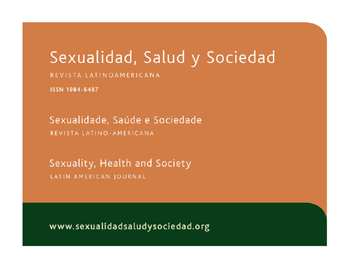EDITORIAL
The articles published in this issue of Sexuality, Health and Society simultaneously evoke a variety of scenes, projected over the immense background of contemporary Latin American society and politics. In such scenes, where scholars stand in as, both, observers, and/or co-protagonists, a diversity of actors engage, and negotiate the meanings of their own practices and those of others, seen as "outsiders." While legislators discuss the limits of Argentine citizens' sex-gender self-determination, members of the Brazilian Federal Supreme Court debate the status of same-sex unions. While government agents-together (or not) with investigators and activists-take up the sanitary control of sex workers and STDs-HIV prevention, promote the improvement of trans women work conditions, and protect women who either cross or are taken over their own national borders to small or large cities in Mexico, Colombia or Brazil; activists collect evidence of discrimination and homophobic experiences suffered by non-heterosexual Mexican men from metropolitan regions.
By focusing on different aspects of those scenarios, one could select, as a first set of discussions, how legislations and court rulings (re)produce and dislocate the meanings of sex-gender relations. The article by Efrem Filho studies Brazilian Federal Supreme Court members' rhetoric regarding the recognition of "homo-affective" stable union status, addressing the triple process of homosexuality's desexualization, affectivization, and privatization. In Can a 'trafficked' woman speak?, Venson & Pedro highlight the link between the Brazilian Penal Code's definition for human traffic, and the renewal and strengthening of abolitionist perspectives on prostitution in our region, demonstrating how assumptions about female weakness and passivity, present in the victimization of "trafficked" women, are being reinforced by this codification. Farji Neer's work on the parliamentary debate over the Gender Identity Act in Argentina shows how legislators' arguments do not challenge the dualisms or the ontological naturalistic fictions of male/female categories, as their rights claims were framed as compensation to victims of suffering. The bill can be considered, at the same time, a landmark in the governmental regulation of bodies, since it does not require a pathologizing diagnosis as a condition for the legal recognition of a self-assigned identity. With images from the film's "The skin I live in," by Pedro Almodôvar, the article by Rodrigues & Heilborn recapitulates-in other terms-the problem of essentializing the male/female binary, gender normativity, and individual autonomy; while dialoguing with the deconstruction of sex/gender difference, as proposed by Judith Butler.
A second set of issues is emerges in the articles by Parrini, Amuchástegui & Garibi, by Urrea & La Furcia, and by Boivin. The first is based on a fieldwork with sex workers in a municipality of the western Mexican coast; the second on research on trans women in the city of Cali, Colombia; and the third on reports collected at a participative evaluation by an NGO in metropolitan area of Mexico City. All the authors produce revealing social maps-both spatial and symbolic-of discrimination and violence lived by the subjects therein, in tension with normative-regulatory markers, and governmental interventions. These articles draw attention on how subjects symbolically re-elaborate, in the urban and bodily space, the positions of social vulnerability created by different social markers of distinction (race, age, foreign origin, gender, and sexuality).
In closing, over a landscape of complex processes of victimization, politicization, and the "naturalization" of a variety of social practices, desires and sex-gender identities-until recently seen as minority, marginal, and condemnable-the articles in this issue allow us to assess the profound ambiguities that seem to be the price to be paid (by legislators, judges, researchers, activists, and by "sufferers" themselves) in the struggles for social recognition and entitlement in our countries.
Publication Dates
-
Publication in this collection
30 Apr 2014 -
Date of issue
Apr 2014

